
View from a hill in Foya City, Lofa County


 There are about 14 towns in the Nyemonweh Chiefdom of Maryland County, Harper District. According to my guide, Nyema Nevis, Puduken (pop. 550) was built in 1832 and is the least developed town of the Chiefdom because it is the only one separated from Cape Palmas by the ocean. There are no schools there, and those who leave to get an education elsewhere normally do not return. Nyema's own brother left for the USA in 1983 and the family has been trying to trace him ever since.
There are about 14 towns in the Nyemonweh Chiefdom of Maryland County, Harper District. According to my guide, Nyema Nevis, Puduken (pop. 550) was built in 1832 and is the least developed town of the Chiefdom because it is the only one separated from Cape Palmas by the ocean. There are no schools there, and those who leave to get an education elsewhere normally do not return. Nyema's own brother left for the USA in 1983 and the family has been trying to trace him ever since.  It is a short canoe ride to get to Puduken, where much of the town's livelihood comes from the cassava and eddoes that grow extraordinarily well in the sandy soil. Nyema's father, John Nevis, is the Town Chief of Puduken. Born in 1921, he has lost his eyesight but is still very much in charge and very highly respected. Before the war, he served as Speaker for the Grebo People of Nyemonweh Chiefdom and represented them in audiences with President William V.S. Tubman and President William R. Tolbert. Today, his request on behalf of his Chiefdom, if he could speak to President Ellen Johnson-Sirleaf, is for a bridge to connect Puduken with the mainland so that development will reach his people.
It is a short canoe ride to get to Puduken, where much of the town's livelihood comes from the cassava and eddoes that grow extraordinarily well in the sandy soil. Nyema's father, John Nevis, is the Town Chief of Puduken. Born in 1921, he has lost his eyesight but is still very much in charge and very highly respected. Before the war, he served as Speaker for the Grebo People of Nyemonweh Chiefdom and represented them in audiences with President William V.S. Tubman and President William R. Tolbert. Today, his request on behalf of his Chiefdom, if he could speak to President Ellen Johnson-Sirleaf, is for a bridge to connect Puduken with the mainland so that development will reach his people. 
 On Tubman Boulevard, Congo Town, Independence Day 2006.
On Tubman Boulevard, Congo Town, Independence Day 2006.  Ataye Shops are a fairly new phenomenon here in Liberia. "Ataye" is a strong tea served in tiny glasses. The fun is in the mixing of it. The server puts the already brewed tea in a small plastic cup, puts in some sugar, and, instead of stirring, he pours the tea from the plastic cup into the glass and vice versa several times (in a very long stream) to mix it.
Ataye Shops are a fairly new phenomenon here in Liberia. "Ataye" is a strong tea served in tiny glasses. The fun is in the mixing of it. The server puts the already brewed tea in a small plastic cup, puts in some sugar, and, instead of stirring, he pours the tea from the plastic cup into the glass and vice versa several times (in a very long stream) to mix it. About an hour's drive from Harper City, Maryland County, along a dusty road winding through lush green landscapes that make one dream of building a sprawling vacation home far from the madding crowd, there is a large town called Whole Graway. (And yes, there is a smaller town nearby called Half Graway!) Whole Graway (pronounced erroneously by most people as "Ho Gravy") is the heart of the Nyemoweh Chiefdom. Situated right near the palm-lined beach, the houses are large mud structures, usually square or rectangular, with thatched roofs. The round structures with cone-shaped roofs are the kithcens -- often shared by more than one family. There are around a hundred houses in the town, but because it is the middle of the day, it is peaceful and quiet. Most of the adults have gone to the farms, leaving behind the elderly, the very young, and the goats who run ahead of our vehicle to warn everyone that strangers have come to visit.
About an hour's drive from Harper City, Maryland County, along a dusty road winding through lush green landscapes that make one dream of building a sprawling vacation home far from the madding crowd, there is a large town called Whole Graway. (And yes, there is a smaller town nearby called Half Graway!) Whole Graway (pronounced erroneously by most people as "Ho Gravy") is the heart of the Nyemoweh Chiefdom. Situated right near the palm-lined beach, the houses are large mud structures, usually square or rectangular, with thatched roofs. The round structures with cone-shaped roofs are the kithcens -- often shared by more than one family. There are around a hundred houses in the town, but because it is the middle of the day, it is peaceful and quiet. Most of the adults have gone to the farms, leaving behind the elderly, the very young, and the goats who run ahead of our vehicle to warn everyone that strangers have come to visit.
 Once upon a time, Liberia was divided into 13 Counties. River Gee and Gbarpolu Counties were created in recent years, bringing the number of counties to 15. There are two rivers running through River Gee County: River Gee, and River Gbeh. River Gbeh is the most powerful, with waves flowing fast and crashing noisily against the rocks. Makes one wonder why the county was named River Gee instead.
Once upon a time, Liberia was divided into 13 Counties. River Gee and Gbarpolu Counties were created in recent years, bringing the number of counties to 15. There are two rivers running through River Gee County: River Gee, and River Gbeh. River Gbeh is the most powerful, with waves flowing fast and crashing noisily against the rocks. Makes one wonder why the county was named River Gee instead.
 I ordered my waterproof hiking boots online, and when they arrived I thought I had overdone it. Even though I had heard stories of the Rainy Season upcountry roads (some with stretches so bad they have names), the boots looked and felt too serious for little old Liberia. Boy, was I wrong! I’m using them for the first time on a trip to River Gee County in the less-traveled southeastern region of the country.
I ordered my waterproof hiking boots online, and when they arrived I thought I had overdone it. Even though I had heard stories of the Rainy Season upcountry roads (some with stretches so bad they have names), the boots looked and felt too serious for little old Liberia. Boy, was I wrong! I’m using them for the first time on a trip to River Gee County in the less-traveled southeastern region of the country.  Even though it didn’t rain much during the days leading up to our journey, what did come from the sky was enough to turn the infamous parts of the unpaved “highway” into bowls of mud soup and traps of sticky red clay. When we aren’t stuck in one for hours struggling to get ourselves out, we’re stuck waiting for hours for other unfortunate souls to get out first. While we wait I love plodding around in the mud with confidence (and an air of experience in rough terrain). It’s also satisfying to know that if we have to hike several miles to the nearest village my boots will be adequately challenged.
Even though it didn’t rain much during the days leading up to our journey, what did come from the sky was enough to turn the infamous parts of the unpaved “highway” into bowls of mud soup and traps of sticky red clay. When we aren’t stuck in one for hours struggling to get ourselves out, we’re stuck waiting for hours for other unfortunate souls to get out first. While we wait I love plodding around in the mud with confidence (and an air of experience in rough terrain). It’s also satisfying to know that if we have to hike several miles to the nearest village my boots will be adequately challenged.
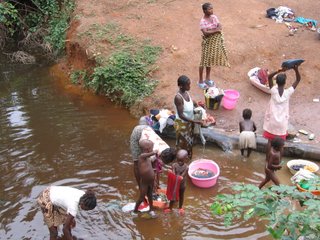 Almost three hours out of Monrovia, on the highway to Gbarnga, there is a little town with an infamous river running through it. One part of the river is used for bathing and washing clothes, and another part is full of giant catfish that have lived there unmolested since the olden days. They come to the surface in a wild thrashing frenzy if you throw pieces of bread in the water. During the civil war, I am told, when there was no food and people were so hungry that they ate rats, lizards, and even other human beings, no one even considered catching the fish of Gbaota.
Almost three hours out of Monrovia, on the highway to Gbarnga, there is a little town with an infamous river running through it. One part of the river is used for bathing and washing clothes, and another part is full of giant catfish that have lived there unmolested since the olden days. They come to the surface in a wild thrashing frenzy if you throw pieces of bread in the water. During the civil war, I am told, when there was no food and people were so hungry that they ate rats, lizards, and even other human beings, no one even considered catching the fish of Gbaota. 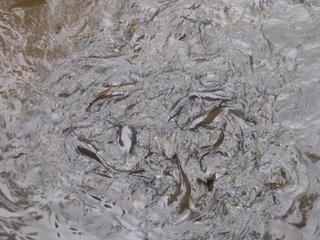 The Town Chief warned that my taking photographs of them would prove useless. “Plenty people try to take their picture,” he said, “but the pictures never come out.” With that in mind, I had an eerie feeling all the way back to Monrovia. Would my digital photos disappear? Paranoid, I kept checking on them. Would we be able to see the fish in the photos? Would my photo of the three young Gbaota girls download as two old women with missing teeth and one with long flat breasts? Would the fish gods of Gbaota let me tell their story??
The Town Chief warned that my taking photographs of them would prove useless. “Plenty people try to take their picture,” he said, “but the pictures never come out.” With that in mind, I had an eerie feeling all the way back to Monrovia. Would my digital photos disappear? Paranoid, I kept checking on them. Would we be able to see the fish in the photos? Would my photo of the three young Gbaota girls download as two old women with missing teeth and one with long flat breasts? Would the fish gods of Gbaota let me tell their story?? 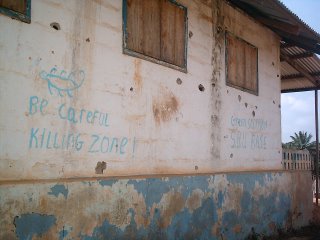
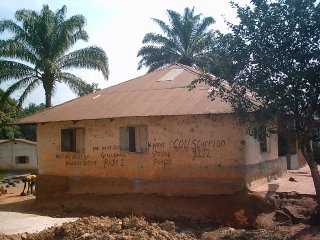

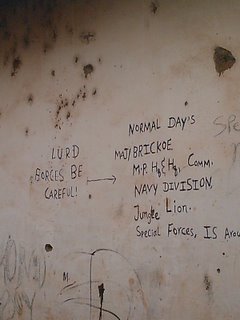
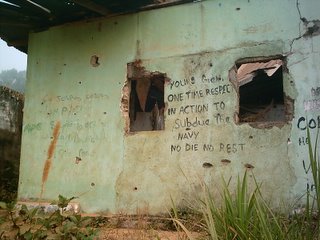

 Towo Finda makes fishing nets with rope made from fibers found in leaves from the palm tree. You fold a long thin leaf in half, and, from the crease, peel away to expose the fine green fibers. The fibers are then twisted together into a thin rope and laid out to dry.
Towo Finda makes fishing nets with rope made from fibers found in leaves from the palm tree. You fold a long thin leaf in half, and, from the crease, peel away to expose the fine green fibers. The fibers are then twisted together into a thin rope and laid out to dry.  Edwin Kpongo and his friends earn a living making bricks out of mud. Each man on the team makes 200 blocks per day, and gets paid $200 Liberian Dollars for his labor. The blocks take up to 15 days to get dry. During construction they are put together with cement, and then plastered. With the plaster and a roof for protection, mud houses last for many years.
Edwin Kpongo and his friends earn a living making bricks out of mud. Each man on the team makes 200 blocks per day, and gets paid $200 Liberian Dollars for his labor. The blocks take up to 15 days to get dry. During construction they are put together with cement, and then plastered. With the plaster and a roof for protection, mud houses last for many years.
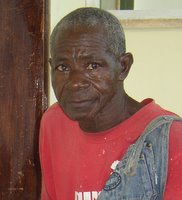 I returned from Lofa County to a house with kids' handprints everywhere and the news that Mr. Marshall, our beloved painter, died while I was away.
I returned from Lofa County to a house with kids' handprints everywhere and the news that Mr. Marshall, our beloved painter, died while I was away.  I loved and respected Mr. Marshall not just as a painter, but as a friend. I liked listening to his stories about painting the Executive Mansion and Tupee Taylor’s house, and I enjoyed watching him interact with my two little boys.
I loved and respected Mr. Marshall not just as a painter, but as a friend. I liked listening to his stories about painting the Executive Mansion and Tupee Taylor’s house, and I enjoyed watching him interact with my two little boys. 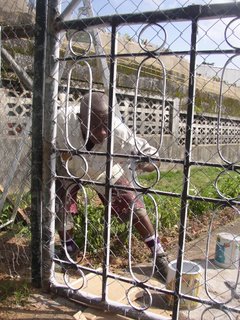 We miss him dearly, but perhaps the Gates of Heaven needed a new coat of paint and Mr. Marshall, at 70, needed a rest. I, for now, will live with my walls the way they are because I cannot imagine having someone else paint them for me.
We miss him dearly, but perhaps the Gates of Heaven needed a new coat of paint and Mr. Marshall, at 70, needed a rest. I, for now, will live with my walls the way they are because I cannot imagine having someone else paint them for me.


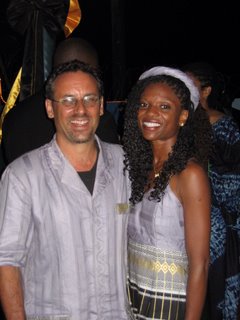


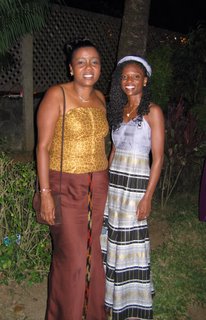

 -Ganta, Nimba County
-Ganta, Nimba County